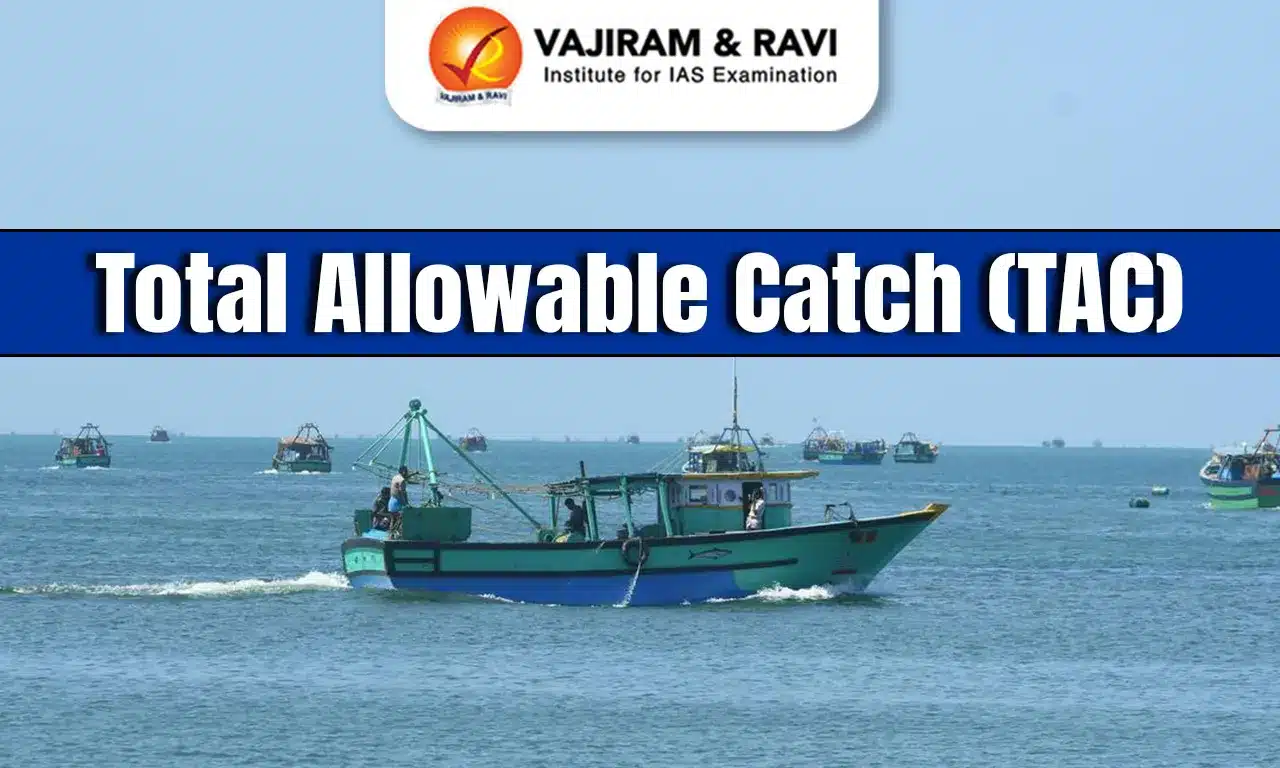Total Allowable Catch (TAC) Latest News
A recent dispute involving the US and Russia highlighted the geopolitical and environmental implications of TAC enforcement.
What is Total Allowable Catch (TAC) ?
- Total Allowable Catch (TAC) refers to the maximum quantity of a particular fish species that can be legally harvested from a specific water body, such as oceans, seas, or lakes, within a defined period.
- It is a regulatory measure adopted by national governments and international fisheries management agencies to ensure the sustainable exploitation of marine resources.
Why is TAC Important?
- TAC ensures the long-term sustainability of fish stocks by maintaining a minimum viable population size that can replenish naturally each year.
- In the absence of TAC, overfishing can occur, depleting fish populations to the extent that they are unable to recover, thus threatening marine biodiversity, ecosystem balance, and the livelihoods of coastal communities.
- It acts as a scientific tool for preventing resource collapse, especially in commercially valuable species.
Indian Context
- India implements a seasonal fishing ban, which functions as a TAC equivalent of zero for a specified duration to conserve fish stocks during the breeding season.
- The ban is enforced in India’s Exclusive Economic Zone (EEZ) for 61 days annually:
- East Coast: From April 15 to June 14
- West Coast: From June 1 to July 31
- This restriction aims to protect spawning fish and support regeneration of marine life during peak monsoon when fish reproduce in large numbers.
Total Allowable Catch (TAC) FAQs
Q1. What does Total Allowable Catch (TAC) mean?
Ans. TAC is the maximum quantity of a specific fish species that can be legally caught in a given period to prevent overfishing.
Q2. Who sets TAC limits?
Ans. TAC is determined by national fisheries authorities or international bodies like FAO or Regional Fisheries Management Organisations (RFMOs).
Q3. How does TAC help marine ecosystems?
Ans. TAC prevents overexploitation of fish stocks, supporting marine biodiversity and long-term sustainability.
Source: TH
Last updated on June, 2025
→ UPSC Notification 2025 was released on 22nd January 2025.
→ UPSC Prelims Result 2025 is out now for the CSE held on 25 May 2025.
→ UPSC Prelims Question Paper 2025 and Unofficial Prelims Answer Key 2025 are available now.
→ UPSC Calendar 2026 is released on 15th May, 2025.
→ The UPSC Vacancy 2025 were released 1129, out of which 979 were for UPSC CSE and remaining 150 are for UPSC IFoS.
→ UPSC Mains 2025 will be conducted on 22nd August 2025.
→ UPSC Prelims 2026 will be conducted on 24th May, 2026 & UPSC Mains 2026 will be conducted on 21st August 2026.
→ The UPSC Selection Process is of 3 stages-Prelims, Mains and Interview.
→ UPSC Result 2024 is released with latest UPSC Marksheet 2024. Check Now!
→ UPSC Toppers List 2024 is released now. Shakti Dubey is UPSC AIR 1 2024 Topper.
→ Also check Best IAS Coaching in Delhi
Tags: Prelims Pointers total allowable catch upsc prelims current affairs
























